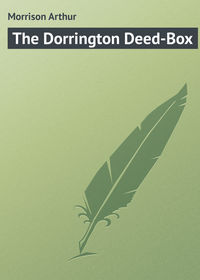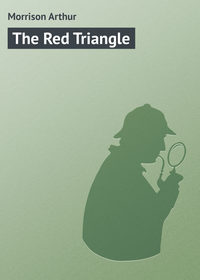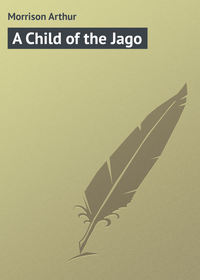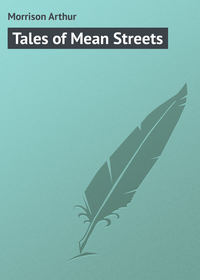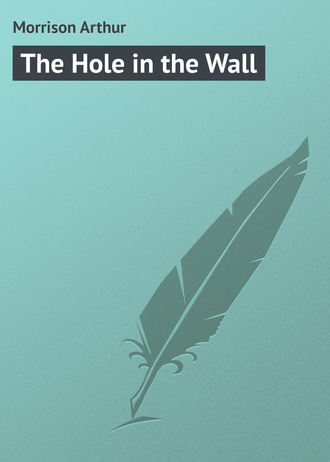 полная версия
полная версияThe Hole in the Wall
There was a new and a longer chorus of reassurance, which Dan at last ended with: "Go on; the Juno ain't ever to come back; is that it?"
Marr turned and stared fishily at him for some seconds. "Wha'rr you mean?" he demanded, at length, with a drivelling assumption of dignity. "Wha'rr you mean? N-never come back? Nishe remark make 'spectable shipowner! Whassor' firm you take us for, eh?"
The blind fiddler stopped midway in a flourish and pursed his lips silently. Dan looked quickly at the fiddler, and as quickly back at the drunken man. Marr's attitude and the turn of his head being favourable, the woman quietly detached his watch.
"Whassor' firm you take us for?" he repeated. "D'ye think 'cause we're – 'cause I come here – 'cause I come 'ere an' – " he stopped foolishly, and tailed off into nothing, smiling uneasily at one and another.
The woman held up the watch behind him – a silver hunter, engraved with Marr's chief initial – a noticeably large letter M. Dan saw it, shook his head and frowned, pointed and tapped his own breast pocket, all in a moment. And presently the woman slipped the watch back into the pocket it came from.
"'Ere, 'ave another drink," said Dan hospitably. "'Ave another all round for the last, 'fore the fiddler goes. 'Ere y'are, George, reach out."
"Eh?" ejaculated the fiddler. "Eh? I ain't goin'! Didn't the genelman ask me to come along? Come, I'll give y' a toon. I'll give y' a chant as 'll make yer 'air curl!"
"Take your drink, George," Dan insisted, "we don't want our 'air curled."
The fiddler groped for and took the drink, swallowed it, and twangled the fiddle-strings. "Will y'ave Black Jack?" he asked.
"No," Dan answered with a rising voice. "We won't 'ave Black Jack, an' what's more we won't 'ave Blind George, see? You cut your lucky, soon as ye like!"
"Awright, awright, cap'en," the fiddler remonstrated, rising reluctantly. "You're 'ard on a pore blind bloke, damme. Ain't I to get nothin' out o' this 'ere? I ask ye fair, didn't the genelman tell me to come along?"
Marr, ducking and lolling over the table, here looked up and said, "Whassup? Fiddler won' go? Gi'm twopence an' kick'm downstairs. 'Ere y'are!" and he pulled out some small change between his fingers, and spilt it on the table.
Dan and the broken-nosed man gathered it up and thrust it into the blind man's hand. "This ain't the straight game," he protested, in a hoarse whisper, as they pushed him through the doorway. "I want my reg'lars out o' that lot. D'ye 'ear? I want my reg'lars!"
But they shut the door on him, whereupon he broke into a torrent of curses on the landing; and presently, having descended several of the stairs, reached back to let drive a thump at the door with his stick; and so went off swearing into the street.
Marr sniggered feebly. "Chucked out fiddler," he said. "Whash we do now? I won'ave any more drink. I 'ad 'nough… Think I'll be gett'n' along… Here, what you after, eh?"
He clapped his hand again to his breast pocket, and turned suspiciously on the woman. "You keep y'r hands off," he said. "Wha' wan' my pocket?"
"Awright, mate," the woman answered placidly. "I ain't a touchin' yer pockets. Why, look there – yer watchguard's 'angin'; you'll drop that presently an' say it's me, I s'pose!"
"You'd better get away from the genelman if you can't behave yourself civil," interposed Dan, pushing the woman aside and getting between them. "'Ere, mate, you got to 'ave another drink along o' me. I'll turn her out arter the fiddler, if she ain't civil."
"I won'ave another drink," said Marr, thickly, struggling unsteadily to his feet and dropping back instantly to his chair. "I won'avanother."
"We'll see about that," replied Dan. "'Ere, you get out," he went on, addressing the woman as he hauled her up by the shoulders. "You get out; we're goin' to be comf'table together, us two an' 'im. Out ye go!" He thrust her toward the door and opened it. "I'm sick o' foolin' about," he added in an angry undertone; "quick's the word."
"O no, Dan – don't," the woman pleaded, whispering on the landing. "Not that way! Not again! I'll get it from him easy in a minute! Don't do it, Dan!"
"Shut yer mouth! I ain't askin' you. You shove off a bit."
"Don't, Dan!"
But the door was shut.
"I tell ye I won'avanother!" came Marr's voice from within.
The woman went down the stairs, her gross face drawn as though she wept, though her eyes were dry. At the door she looked back with something like a shudder, and then turned her steps down the street.
The two partners in Viney and Marr were separated indeed; but now it was by something more than half a mile of streets.
CHAPTER III
STEPHEN'S TALE
I had never been home with Grandfather Nat before. I fancy that some scruples of my mother's, in the matter of the neighbourhood and the character of the company to be seen and heard at the Hole in the Wall, had hitherto kept me from the house, and even from the sugary elysium of the London Dock. Now I was going there at last, and something of eager anticipation overcame the sorrow of the day.
We went in an omnibus, which we left in Commercial Road. Here my grandfather took order to repair my disappointment in the matter of pear-drops; and we left the shop with such a bagful that it would not go into the accustomed pocket at all. A little way from this shop, and on the opposite side of the way, stood a house which my mother had more than once pointed out to me already; and as we came abreast of it now, Grandfather Nat pointed it out also. "Know who lives there, Stevy?" he asked.
"Yes," I said; "Mr. Viney, that father's ship belongs to."
There was a man sitting on the stone baluster by the landing of the front steps, having apparently just desisted from knocking at the door. He was pale and agitated, and he slapped his leg distractedly with a folded paper.
"Why," said my grandfather, "that's Crooks, the ship-chandler. He looks bad; wonder what's up?"
With that the door opened, and a servant-girl, in bonnet and shawl, emerged with her box, lifting and dragging it as best she might. The man rose and spoke to her, and I supposed that he was about to help. But at her answer he sank back on the balustrade, and she hauled the box to the pavement by herself. The man looked worse than ever, now, and he moved his head from side to side; so that it struck me that it might be that his mother also was dead; perhaps to-day; and at the thought all the flavour went from the pear-drop in my mouth.
We turned up a narrow street which led us to a part where the river plainly was nearer at every step; for well I knew the curious smell that grew as we went, and that had in it something of tar, something of rope and junk, something of ships' stores, and much of a blend of unknown outlandish merchandise. We met sailors, some with parrots and accordions, and many with undecided legs; and we saw more of the hang-dog fellows who were not sailors, though they dressed in the same way, and got an inactive living out of sailors, somehow. They leaned on posts, they lurked in foul entries, they sat on sills, smoking; and often one would accost and hang to a passing sailor, with a grinning, trumped-up cordiality that offended and repelled me, child as I was. And there were big, coarse women, with flaring clothes, and hair that shone with grease; though for them I had but a certain wonder; as for why they all seemed to live near the docks; why they all grew so stout; and why they never wore bonnets.
As we went where the street grew fouler and more crooked, and where dark entries and many turnings gave evidence of the complication of courts and alleys about us, we heard a hoarse voice crooning a stave of a sea-song, with the low scrape of a fiddle striking in here and there, as it were at random. And presently there turned a corner ahead and faced toward us a blind man, with his fiddle held low against his chest, and his face lifted upward, a little aside. He checked at the corner to hit the wall a couple of taps with the stick that hung from his wrist, and called aloud, with fouler words than I can remember or could print: "Now then, damn ye! Ain't there ne'er a Christian sailor-man as wants a toon o' George? Who'll 'ave a toon o' George? Ain't ye got no money, damn ye? Not a brown for pore blind George? What a dirty mean lot it is! Who'll 'ave a 'ornpipe? Who'll 'ave a song o' pore George?.. O damn y' all!"
And so, with a mutter and another tap of the stick, he came creeping along, six inches at a step, the stick dangling loose again, and the bow scraping the strings to the song: —
Fire on the fore-top, fire on the bow,Fire on the main-deck, fire down below!Fire! fire! fire down below!Fetch a bucket o' water; fire down below!The man's right eye was closed, but the left was horribly wide and white and rolling, and it quite unpleasantly reminded me of a large china marble that lay at that moment at the bottom of my breeches pocket, under some uniform buttons, a key you could whistle on, a brass knob from a fender, and a tangle of string. So much indeed was I possessed with this uncomfortable resemblance in later weeks, when I had seen Blind George often, and knew more of him, that at last I had no choice but to fling the marble into the river; though indeed it was something of a rarity in marbles, and worth four "alleys" as big as itself.
My grandfather stopped his talk as we drew within earshot of the fiddler; but blind men's ears are keen beyond the common. The bow dropped from the fiddle, and Blind George sang out cheerily: "Why, 'ere comes Cap'en Nat, 'ome from the funeral; and got 'is little grandson what 'e's goin' to take care of an' bring up so moral in 'is celebrated 'ouse o' call!" All to my extreme amazement: for what should this strange blind man know of me, or of my mother's funeral?
Grandfather Nat seemed a little angry. "Well, well," he said, "your ears are sharp, Blind George; they learn a lot as ain't your business. If your eyes was as good as your ears you'd ha' had your head broke 'fore this – a dozen times!"
"If my eyes was as good as my ears, Cap'en Nat Kemp," the other retorted, "there's many as wouldn't find it so easy to talk o' breakin' my 'ed. Other people's business! Lord! I know enough to 'ang some of 'em, that's what I know! I could tell you some o' your business if I liked, – some as you don't know yourself. Look 'ere! You bin to a funeral. Well, it ain't the last funeral as 'll be wanted in your family; see? The kid's mother's gone; don't you be too sure 'is father's safe! I bin along o' some one you know, an' 'e don't look like lastin' for ever, 'e don't; 'e ain't in 'ealthy company."
Grandfather Nat twitched my sleeve, and we walked on.
"Awright!" the blind man called after us, in his tone of affable ferocity. "Awright, go along! You'll see things, some day, near as well as I can, what's blind!"
"That's a bad fellow, Stevy," Grandfather Nat said, as we heard the fiddle and the song begin again. "Don't you listen to neither his talk nor his songs. Somehow it don't seem nat'ral to see a blind man such a bad 'un. But a bad 'un he is, up an' down."
I asked how he came to know about the funeral, and especially about my coming to Wapping – a thing I had only learned of myself an hour before. My grandfather said that he had probably learned of the funeral from somebody who had been at the Hole in the Wall during the day, and had asked the reason of the landlord's absence; and as to myself, he had heard my step, and guessed its meaning instantly. "He's a keen sharp rascal, Stevy, an' he makes out all of parties' business he can. He knew your father was away, an' he jumped the whole thing at once. That's his way. But I don't stand him; he don't corne into my house barrin' he comes a customer, which I can't help."
Of the meaning of the blind man's talk I understood little. But he shocked me with a sense of insult, and more with one of surprise. For I had entertained a belief, born of Sunday-school stories, that blindness produced saintly piety – unless it were the piety that caused the blindness – and that in any case a virtuous meekness was an essential condition of the affliction. So I walked in doubt and cogitation.
And so, after a dive down a narrower street than any we had yet traversed (it could scarce be dirtier), and a twist through a steep and serpentine alley, we came, as it grew dusk, to the Hole in the Wall. Of odd-looking riverside inns I can remember plenty, but never, before or since, have I beheld an odder than this of Grandfather Nat's. It was wooden and clap-boarded, and, like others of its sort, it was everywhere larger at top than at bottom. But the Hole in the Wall was not only top-heavy, but also most alarmingly lopsided. By its side, and half under it, lay a narrow passage, through which one saw a strip of the river and its many craft, and the passage ended in Hole-in-the-Wall Stairs. All of the house that was above the ground floor on this side rested on a row of posts, which stood near the middle of the passage; and the burden of these posts, twisted, wavy, bulging, and shapeless, hung still more toward the opposite building; while the farther side, bounded by a later brick house, was vertical, as though a great wedge, point downward, had been cut away to permit the rise of the newer wall. And the effect was as of a reeling and toppling of the whole construction away from its neighbour, and an imminent downfall into the passage. And when, later, I examined the side looking across the river, supported on piles, and bulging and toppling over them also, I decided that what kept the Hole in the Wall from crashing into the passage was nothing but its countervailing inclination to tumble into the river.
Painted large over the boards of the front, whose lapped edges gave the letters ragged outlines, were the words THE HOLE IN THE WALL; and below, a little smaller, NATHANIEL KEMP. I felt a certain pride, I think, in the importance thus given the family name, and my esteem of my grandfather increased proportionably with the size of the letters.
There was a great noise within, and Grandfather Nat, with a quick look toward the entrance, grunted angrily. But we passed up the passage and entered by a private door under the posts. This door opened directly into the bar parlour, the floor whereof was two steps below the level of the outer paving; and the size whereof was about thrice that of a sentry-box.
The din of a quarrel and a scuffle came from the bar, and my grandfather, thrusting me into a corner, and giving me his hat, ran out with a roar like that of a wild beast. At the sound the quarrel hushed in its height. "What's this?" my grandfather blared, with a thump on the counter that made the pots jump. "What sort of a row's this in my house? Damme, I'll break y' in halves, every mother's son of ye!"
I peeped through the glass partition, and saw, first, the back of the potman's head (for the bar-floor took another drop) and beyond that and the row of beer-pulls, a group of rough, hulking men, one with blood on his face, and all with an odd look of sulky guilt.
"Out you go!" pursued Grandfather Nat, "every swab o' ye! Can't leave the place not even to go to – not for nothin', without a row like this, givin' the house a bad name! Go on, Jim Crute! Unless I'm to chuck ye!"
The men had begun filing out awkwardly, with nothing but here and there: "Awright, guv'nor" – "Awright, cap'en." "Goin', ain't I?" and the like. But one big ruffian lagged behind, scowling and murmuring rebelliously.
In a flash Grandfather Nat was through the counter-wicket. With a dart of his long left arm he had gripped the fellow's ear and spun him round with a wrench that I thought had torn the ear from the head; and in the same moment had caught him by the opposite wrist, so as to stretch the man's extended arm, elbow backward, across his own great chest; a posture in which the backward pull against the elbow joint brought a yell of agony from the victim. Only a man with extraordinarily long arms could have done the thing exactly like that. The movement was so savagely sudden that my grandfather had kicked open the door and flung Jim Crute headlong into the street ere I quite understood it; when there came a check in my throat and tears in my eyes to see the man so cruelly handled.
Grandfather Nat stood a moment at the door, but it seemed that his customer was quelled effectually, for presently he turned inward again, with such a grim scowl as I had never seen before. And at that a queer head appeared just above the counter – I had supposed the bar to be wholly cleared – and a very weak and rather womanish voice said, in tones of over-inflected indignation: "Serve 'em right, Cap'en Kemp, I'm sure. Lot o' impudent vagabones! Ought to be ashamed o' theirselves, that they ought. Pity every 'ouse ain't kep' as strict as this one is, that's what I say!"
And the queer head looked round the vacant bar with an air of virtuous defiance, as though anxious to meet the eye of any so bold as to contradict.
It was anything but a clean face on the head, and it was overshadowed by a very greasy wideawake hat. Grubbiness and unhealthy redness contended for mastery in the features, of which the nose was the most surprising, wide and bulbous and knobbed all over; so that ever afterward, in any attempt to look Mr. Cripps in the face, I found myself wholly disregarding his eyes, and fixing a fascinated gaze on his nose; and I could never recall his face to memory as I recalled another, but always as a Nose, garnished with a fringe of inferior features. The face had been shaved – apparently about a week before; and by the sides hung long hair, dirtier to look at than the rest of the apparition.
My grandfather gave no more than a glance in the direction of this little man, passed the counter and re-joined me, pulling off his coat as he came. Something of my tingling eyes and screwed mouth was visible, I suppose, for he stooped as he rolled up his shirt-sleeves and said: "Why, Stevy boy, what's amiss?"
"You – you – hurt the man's ear," I said, with a choke and a sniff; for till then Grandfather Nat had seemed to me the kindest man in the world.
Grandfather Nat looked mightily astonished. He left his shirt-sleeve where it was, and thrust his fingers up in his hair behind, through the grey and out at the brown on top. "What?" he said. "Hurt 'im? Hurt 'im? Why, s'pose I did? He ain't a friend o' yours, is he, young 'un?"
I shook my head and blinked. There was a gleam of amusement in my grandfather's grim face as he sat in a chair and took me between his knees. "Hurt 'im?" he repeated. "Why, Lord love ye, I'd get hurt if I didn't hurt some of 'em, now an' then. They're a rough lot – a bitter bad lot round here, an' it's hurt or be hurt with them, Stevy. I got to frighten 'em, my boy – an' I do it, too."
I was passing my fingers to and fro in the matted hair on my grandfather's arm, and thinking. He seemed a very terrible man now, and perhaps something of a hero; for, young as I was, I was a boy. So presently I said, "Did you ever kill a man, Gran'fa' Nat?"
CHAPTER IV
STEPHEN'S TALE
Many small matters of my first few hours at the Hole in the Wall were impressed on me by later events. In particular I remember the innocent curiosity with which I asked: "Did you ever kill a man, Gran'fa' Nat?"
There was a twitch and a frown on my grandfather's face, and he sat back as one at a moment's disadvantage. I thought that perhaps he was trying to remember. But he only said, gruffly, and with a quick sound like a snort: "Very nigh killed myself once or twice, Stevy, in my time," and rose hastily from his chair to reach a picture of a ship that was standing on a shelf. "There," he said, "that's a new 'un, just done; pretty picter, ain't it? An' that there," pointing to another hanging on the wall, "that's the Juno, what your father's on now."
I had noticed that the walls, both of the bar and of the bar-parlour, were plentifully hung with paintings of ships; ships becalmed, ships in full sail, ships under bare spars; all with painful blue skies over them, and very even-waved seas beneath; and ships in storms, with torn sails, pursued by rumbustious piles of sooty cloud, and pelted with lengths of scarlet lightning. I fear I should not have recognised my father's ship without help, but that was probably because I had only seen it, months before, lying in dock, battered and dingy, with a confusion of casks and bales about the deck, and naked yards dangling above; whereas in the picture (which was a mile too small for the brig) it was booming along under a flatulent mountain of clean white sail, and bulwarks and deck-fittings were gay with lively and diversified colour.
I said something about its being a fine ship, or a fine picture, and that there were a lot of them.
"Ah," he said, "they do mount up, one arter another. It's one gentleman as did 'em all – him out in the bar now, with the long hair. Sometimes I think I'd rather a-had money; but it's a talent, that's what it is!"
The artist beyond the outer bar had been talking to the potman. Now he coughed and said: "Ha – um! Cap'en Kemp, sir! Cap'en Kemp! No doubt as you've 'eard the noos to-day?"
"No," said Grandfather Nat, finishing the rolling of his shirt-sleeves as he stepped down into the bar; "not as I know on. What is it?"
"Not about Viney and Marr?"
"No. What about 'em?"
Mr. Cripps rose on his toes with the importance of his information, and his eyes widened to a moment's rivalry with his nose. "Gone wrong," he said, in a shrill whisper that was as loud as his natural voice. "Gone wrong. Unsolvent. Cracked up. Broke. Busted, in a common way o' speakin'." And he gave a violent nod with each synonym.
"No," said Grandfather Nat; "surely not Viney and Marr?"
"Fact, Cap'en; I can assure you, on 'igh a'thority. It's what I might call the universal topic in neighbourin' circles, an' a gen'ral subjick o' local discussion. You'd 'a 'eard it 'fore this if you'd bin at 'ome."
My grandfather whistled, and rested a hand on a beer-pull.
"Not a stiver for nobody, they say," Mr. Cripps pursued, "not till they can sell the wessels. What there was loose Marr's bolted with; or, as you might put it, absconded; absconded with the proceeds. An' gone abroad, it's said."
"I see the servant gal bringin' out her box from Viney's just now," said Grandfather Nat. "An' Crooks the ship-chandler was on the steps, very white in the gills, with a paper. Well, well! An' you say Marr's bolted?"
"Absconded, Cap'en Kemp; absconded with the proceeds; 'opped the twig. Viney says 'e's robbed 'im as well as the creditors, but I 'ear some o' the creditors' observation is 'gammon.' An' they say the wessels is pawned up to their r'yals. Up to their r'yals!"
"Well," commented my grandfather, "I wouldn't ha' thought it. The Juno was that badly found, an' they did everything that cheap, I thought they made money hand over fist."
"Flyin' too 'igh, Cap'en Kemp, flyin' too 'igh. You knowed Viney long 'fore 'e elevated hisself into a owner, didn't you? What was he then? Why, 'e was your mate one voy'ge, wasn't he?"
"Ay, an' more."
"So I've 'eard tell. Well, arter that surely 'e was flyin' too 'igh! An' now Marr's absconded with the proceeds!"
The talk in the bar went on, being almost entirely the talk of Mr. Cripps; who valued himself on the unwonted importance his news gave him, and aimed at increasing it by saying the same thing a great many times; by saying it, too, when he could, in terms and phrases that had a strong flavour of the Sunday paper. But as for me, I soon ceased to hear, for I discovered something of greater interest on the shelf that skirted the bar-parlour. It was a little model of a ship in a glass case, and it was a great marvel to me, with all its standing and running rigging complete, and a most ingenious and tumultuous sea about it, made of stiff calico cockled up into lumps and ridges, and painted the proper colour. Much better than either of the two we had at home, for these latter were only half-models, each nothing but one-half of a little ship split from stem to stern, and stuck against a board, on which were painted sky, clouds, seagulls, and (in one case) a lighthouse; an exasperating make-believe that had been my continual disappointment.
But this was altogether so charming and delightful and real, and the little hatches and cuddy-houses so thrilled my fancy, that I resolved to beg of my grandfather to let me call the model my own, and sometimes have the glass case off. So I was absorbed while the conversation in the bar ranged from the ships and their owners to my father, and from him to me; as was plain when my grandfather called me.




